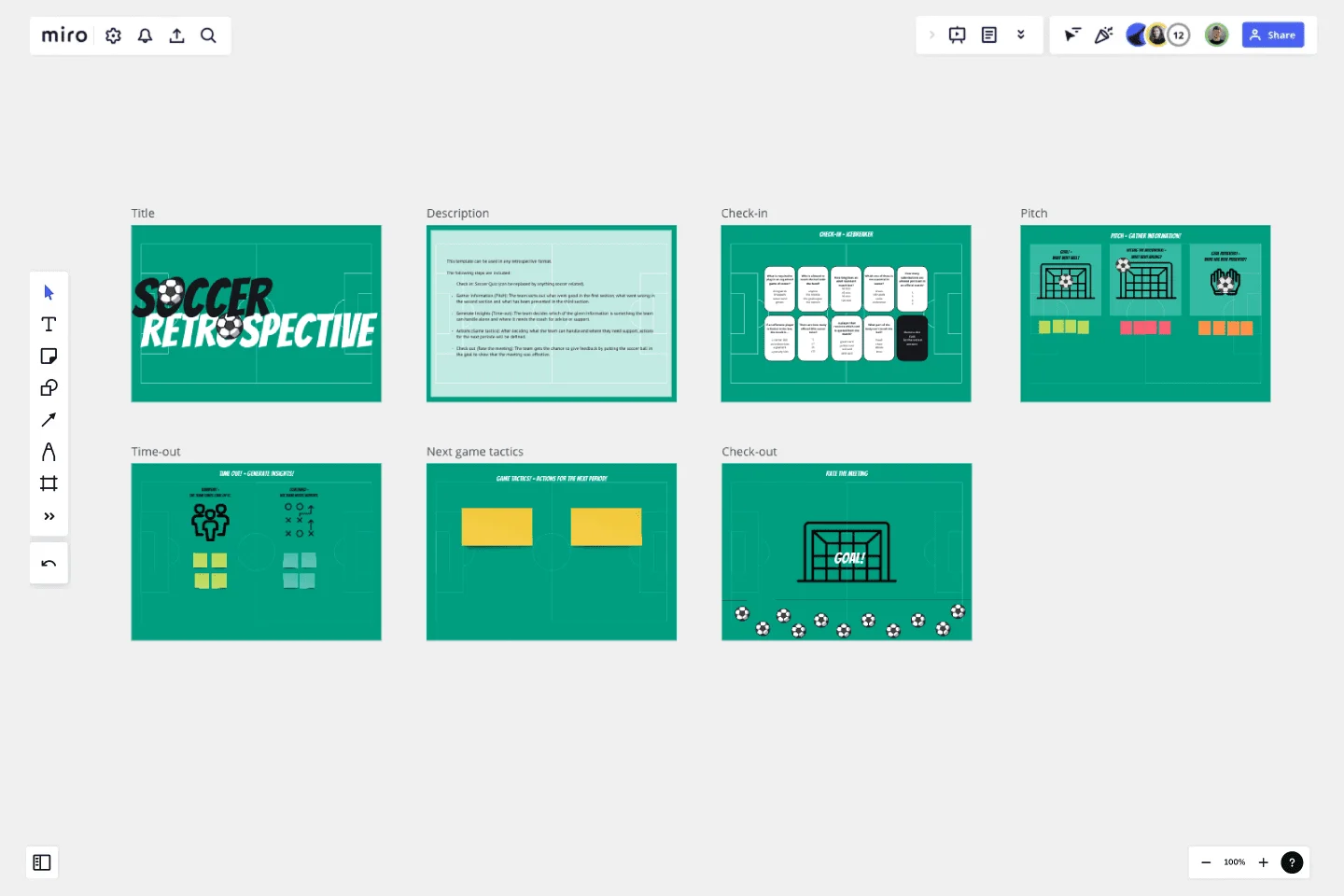Soccer Retrospective
This is a 60-90 minute retrospective inspired by soccer.
The goal of this retrospective is to help team members look back at a Sprint, project or a periode in general and evaluate what went well, what went not well and what was prevented.
How to use this template
This template can be used in a team from 2 to 9 people or even bigger teams. Just copy or remove icons to fit it to your team size.
Check-in: Just start with a check in of your choice or use the soccer quiz.
Gather information: With the three spaces for what went well, what went not well and what was pevented.
Generate insights: With the two spaces to decide what the team can handle alone without support and where the team needs support or advice from the coach.
Actions: Decide which actions are needed for the next periode.
Check-out: Let the team decide if the meeting has scored a goal.
This template was created by Daniel Fischer.
Get started with this template right now.
Design Sprint Retrogram
Works best for:
Agile, Retrospective
The Design Sprint Retrogram template facilitates retrospective sessions for Design Sprint teams to reflect on their experiences and identify improvement opportunities. It provides a structured framework for reviewing sprint outcomes, discussing what worked well, what didn't, and generating actionable insights. This template fosters a culture of continuous learning and refinement, empowering teams to enhance their sprint process and deliver better outcomes in subsequent sprints.
PI Planning Template
Works best for:
Agile Methodology, Strategic Planning, Software Development
PI planning stands for “program increment planning.” Part of a Scaled Agile Framework (SAFe), PI Planning helps teams strategize toward a shared vision. In a typical PI planning session, teams get together to review a program backlog, align cross-functionally, and decide on the next steps. Many teams carry out a PI planning event every 8 to 12 weeks, but you can customize your planning schedule to fit your needs. Use PI planning to break down features, identify risks, find dependencies, and decide which stories you’re going to develop.
Daily Stand-up Meeting Template
Works best for:
Agile Methodology, Meetings, Software Development
The entire team meets to review the day before and discuss the day ahead. These daily meetings, also known as “scrums,” are brief but powerful — they identify roadblocks, give each team member a voice, foster collaboration, keep progress on track, and ultimately keep teams working together effectively. This template makes it so easy for you to plan daily standups for your sprint team. It all starts with picking a date and time, creating an agenda, and sticking with the same format throughout the sprint.
Start, Stop, Continue Retrospective by Laura Timmins
Works best for:
Retrospectives, Agile Methodologies
The Retrospective template offers a flexible and customizable framework for teams to reflect on past experiences and identify areas for improvement. It provides elements for sharing successes, challenges, and action items. This template enables teams to facilitate constructive discussions, generate insights, and drive continuous improvement. By promoting reflection and collaboration, the Retrospective empowers teams to optimize performance and achieve their goals effectively.
Iceberg Reflection
Works best for:
Agile
The Iceberg Reflection template is a visual tool for facilitating reflective exercises within Agile teams. It prompts participants to explore both visible and underlying aspects of challenges or successes, akin to an iceberg where only a portion is visible above the waterline. This template encourages deeper reflection and insights, fostering a culture of continuous improvement and learning. By addressing root causes and hidden factors, teams can better understand and overcome obstacles, driving growth and resilience.
Learning Loop Retro Template
Works best for:
Retros, Agile
The Learning Loop Retro template is a powerful tool designed to help teams reflect on their projects by recognizing successes and identifying areas for improvement. This template is part of Miro's Intelligent templates, which streamline workflows and keep teams engaged by integrating AI, interactive tools, and seamless integrations. One key benefit of the Learning Loop Retro template is its ability to drive continuous improvement. By regularly reflecting on their work and identifying areas for enhancement, teams can consistently elevate their performance and achieve better outcomes.
